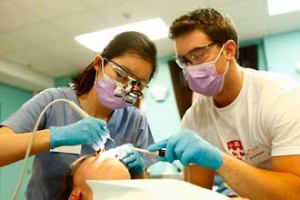
Dental Outreach Program offers free care to the most needy
By Neale McDevitt
Of the University’s many community-based initiatives, none puts a smile on people’s faces as literally and lastingly as the McGill Dental Outreach Program.
It is everything outreach is supposed to be; impacting the lives of people in need; bringing services to neighborhoods; and benefiting the health care providers as much as the patients. Little wonder it is one of McGill’s flagship programs and winner of the Canadian Council for the Advancement of Education 2005 silver medal for Best Community Outreach Program.
The backbone of the program are the dental students, with first- and second-year students assisting those in their third and fourth years of study.
“This is actually a certified course in our dental curriculum,” said Faculty of Dentistry professor Bruce Dobby, one of the Program’s co-directors along with Yu Kwong Li. “But I hate using the word ‘compulsory’ because the students absolutely love coming to these clinics.”
The students are so enamoured with the program they spend much of their free time fundraising for it. “They bag groceries, have an annual Chinese New Year dinner and staged a run on the mountain on a cold rainy day this October that drew 150 students,” said Dobby. “Every year they raise over $15,000. And we never ask them to do this.”
Make no mistake, this is a modern day M*A*S*H unit without the army fatigues. Packed neatly into the back of an Econoline truck, the fully functioning mobile dental clinic is comprised of eight chairs and accompanying equipment – including, among other items – compressors, sterilizers and high-tech ultrasonic scaling units. Eighteen times a year, Dobby drives the van up to the curb of a community centre, school or any other suitable site, and within an hour the clinic is unloaded, installed and ready for its first patients.
Because the clinic serves organizations like Sun Youth, Dans la Rue and the Welcome Home Mission, many of the patients – which include street kids, recovering addicts, and people with physical and mental disabilities – haven’t seen a dentist in years. While the McGill dentists are equipped to do cleanings, minor denture adjustments, restorations and oral hygiene instruction, they often are faced with problems that require more extensive intervention.
Those patients are then brought to the Faculty’s two all-day clinics at the Montreal General Hospital where dental students, under the supervision of oral surgeons, can undertake more complex procedures such as extractions. “Unfortunately, given the demographics of these patients, we do a lot of extractions,” said Dobby.
Even with the Saturday clinic, the program sometimes encounters patients whose needs are greater than what the outreach can provide for – patients who require dentures, for example. Thanks to fundraising efforts and the support of foundations and agencies, the Extended Treatment Fund was established, paying for these patients to go to the Faculty’s main clinic, again at the Montreal General – a 40-chair facility where people can receive full treatment. “It’s a third level of commitment because we’re really trying to give complete dentistry treatment for these people,” said Dobby.
The impact on the patients can be profound. Problems with teeth can lead to nutritional obstacles and even malnutrition as people eat more soft and processed foods.
But Dobby believes that the impact on the dental students is equally profound. “I believe that if a health care student doesn’t develop some sort of social awareness in their education, that education isn’t complete,” he said. “Our students get that education and they are better dentists and people for it.”
